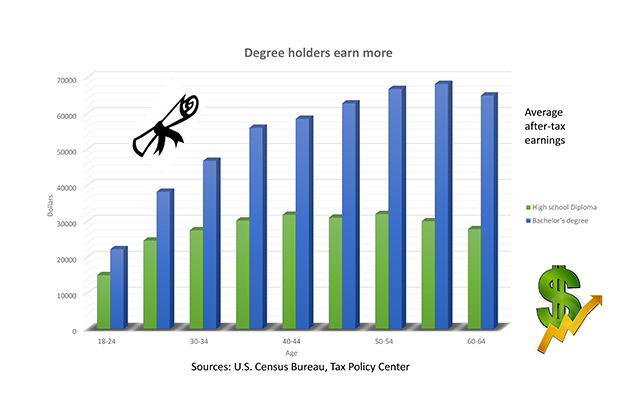‘Welcoming spirit’ key to college retention
Infographic by Matthew Barney | The Chart
US Census Bureau data shows the difference between financial earnings of high school and college graduates. Information illustrates that a bachelor’s degree, in fact, makes an impact.
With the new school year upon us, Missouri Southern’s administration renewed its efforts once again this week to spread the word on campus of the importance of graduating from college. Student retention has long been a vital issue for Universities across the nation including Missouri Southern who is doing everything it can to ensure students don’t drop out.
“It’s one of the most important issues I deal with,” said University President Alan Marble. “All of their lives we’ve told these kids ‘stay in school’ and now that they’re here we need to change that message to ‘finish school.’ I’m not sure our students understand just how important it is. It’s not just about starting the race; you have to finish it.”
According to the Census Bureau, the holder of a bachelor’s degree can expect to make $2.025 million more over the course of their lifetime compared to a non-degree holder. That diploma also starts to pay off very quickly. According to the Pew Research Centre, College graduates aged 25 to 32 who are working full time earn about $17,500 more annually than their peers without one.
“Were doing all we can to keep our students in school but it usually boils down to connections,” said Marble. “Do students get connected with other students and professors early on, that’s the first hurdle. It’s critical that our students feel welcome on campus which is why we have so many events the first few weeks of the year.”
According to the IPEDS Fall Enrollment Surveys, only 65 percent of first-time, full-time bachelor’s seeking students at Southern in 2013 returned the following year, a figure that is up five percent from 2011. Graduation rates are even worse, only 16 percent of 2008’s freshman class was able to complete their degree in four years. That number rose to only 36 percent after their sixth year, figures Southern are determined to improve.
“My advice to anyone thinking of dropping out is ‘don’t,’” said Darren Fullerton, vice president for student affairs. “I know sometimes students feel overwhelmed and that they don’t have any other option, but I would tell them to please come by and talk to me first before they do anything. We have a lot of options that they might not know are available to them where we can help.”
Despite the struggles that many young college students face, a four-year degree has likely never been more valuable and a decision not to graduate could be the most economically irrational decision you could make. An analysis of Labor Department statistics by the Economic Policy Institute in Washington shows that Americans with four-year college degrees made 98 percent more an hour on average in 2013 than people without a degree. That’s up from 89 percent five years earlier, 85 percent a decade earlier and 64 percent in the early 1980s.
“Dropping out of school is one of the biggest mistakes I ever made,” said former Southern student Brad Cavener. Cavener, now 32 says he would give anything to go back and change it.
“I try not to base my happiness on how much money I have in the bank but sometimes life is very hard. I always thought I would have time to go back to school, but life happened, and too many things got in the way. My advice would be to stick with it at all costs and the four years will go by in no time.”
Your donation will support the student journalists of Missouri Southern State University. Your contribution will allow us to purchase equipment and cover our annual website hosting costs.




























